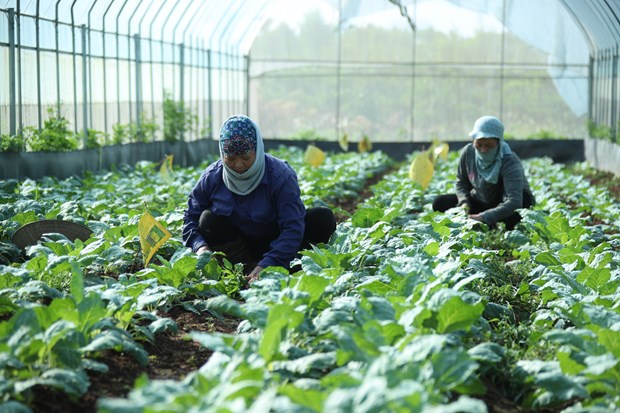 Society
Society


|
| Organic vegetables grown at Tiên Dương Co-operative in Tiên Dương Commune, Hà Nội's Đông Anh District. — VNA/VNS Photo |
HÀ NỘI — Organic agriculture production and consumption in Việt Nam is facing many challenges from modest size, output and capital shortage to consumer doubt over quality and origin.
Speaking at an online forum on organic agriculture on Wednesday, Deputy General Director of NHONHO Certification Company Trần Thế Như Hiệp said that organic agriculture production was in a process switching from unsafe agricultural production to prioritise productivity, output, increased land rotation and increased value of areas for safe organic production.
Organic farming usually featured low yield, natural farming, vulnerability to pests, and reduced soil rotation.
Hiệp said that organic farms faced difficulties in getting quality certification.
Moreover, it required high production costs and a lot of time to switch over, Hiệp said.
“To promote the development of organic farming in the country, it is necessary to analyse, forecast and assess the potential, advantages, challenges and development trends of organic agriculture,” he said.
“We need to identify advantageous production areas and key products and markets for commodity-oriented organic production.”
Localities should implement national organic agriculture projects, while continuing to raise public awareness about organic food production and consumption, Hiệp said.
"The goal of 'increasing productivity to ensure food security' should be given to arranging land for key organic agricultural production,” he said, adding that each locality needed to develop its own organic agriculture scheme.
“It is necessary to coordinate across sectors to manage quality, labelling and connect organic product consumption, helping to increase the value of organic products in the domestic and export markets," said Hiệp.
Lê Viết Bình, deputy chief of office of the Ministry of Agriculture and Rural Development, said that the trend in green agriculture and organic agriculture was inevitable. Until now, green and organic farming produce was mostly for export by private enterprises or for daily use by farming households.
According to the ministry, the total area of organic cultivation is currently just over 23,000ha, including 11,000 for rice and corn, more than 2,000 for vegetables, 2,800 for tea, 4,700 for organic fruit trees and over 2,155 of organic cashew trees.
However, Việt Nam's organic agricultural production is still spontaneous, small-scale, and needs stable and sustainable development. Currently, there is no set of specific regulations and standards for each type of product.
The national standard TCVN 1104:2015 guiding the production, processing, labelling and marketing of foods produced by organic methods, issued by the Ministry of Science and Technology in 2015 has not come to life.
The standard will soon be replaced by the National Standard TCVN 11041:2017, which was drafted with more detailed regulations, Bình said.
“The completion of standards and regulations on organic products in harmony with international standards is essential for all involved parties. The awareness of organic agricultural producers is not good enough for creating clean agricultural produce that is trusted by consumers,” he said.
“So far, the majority of farmers do not want to convert to organic agriculture due to unproven income benefits and an uncommitted consumption market.”
Meanwhile, the production process requires a long time to improve the soil, and create a source of irrigation water to meet the quality requirements, so costs are high.
It is recommended that the Government has regional planning with prioritised products, and a long-term land allocation mechanism with an appropriate planting term for each item of produce.
Policies are needed to attract all economic sectors to participate in organic agriculture. Specifically, policies must support producers and market realities, not solely be for managing business. — VNS




